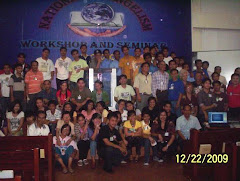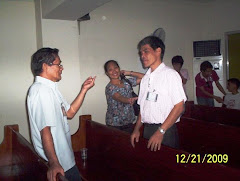.jpg) Driving into a storm in the mountains in the middle of the night is a dangerous experience, and seasoned motorcyclists don’t usually recommend that. Mountain roads are muddy and slippery; dark clouds above you hover like a threat: to pour in more rains, as if to wash away the sad experiences of human downfalls. There are breaks on the road, gullies deep and shallow, that have been created by downpours that have prolonged. One single mistake, one miscalculation, and you will fall–into the ditch, into the gully, or into the high cliff on either side of the road. Motorbikes such as yours may have been equipped with modern halogen lamps, but on a stormy night like this, their glow could hardly penetrate the thick curtains of fogs and mists before you. You are driving blind, and your temptation is to trust your instincts, or, as pilots would say,” fly by the seat of your pants.” But doing so would be courting trouble. You have no compass to guide you in the midst of the fogs.
Driving into a storm in the mountains in the middle of the night is a dangerous experience, and seasoned motorcyclists don’t usually recommend that. Mountain roads are muddy and slippery; dark clouds above you hover like a threat: to pour in more rains, as if to wash away the sad experiences of human downfalls. There are breaks on the road, gullies deep and shallow, that have been created by downpours that have prolonged. One single mistake, one miscalculation, and you will fall–into the ditch, into the gully, or into the high cliff on either side of the road. Motorbikes such as yours may have been equipped with modern halogen lamps, but on a stormy night like this, their glow could hardly penetrate the thick curtains of fogs and mists before you. You are driving blind, and your temptation is to trust your instincts, or, as pilots would say,” fly by the seat of your pants.” But doing so would be courting trouble. You have no compass to guide you in the midst of the fogs.But there are barking dogs. They warn you that you are approaching a hut, before you bump your machine into a mass of sleeping bodies.
What if you find yourself on this stretch of mountain roads with not a single house on either side, and no dogs? What if you are deafened by the blasts of rains, lightnings and thunderstorms, and you are not hearing the barking of the dogs? What if their barking sounds like mere whimpering? And what if the dogs don’t bark at all?
We all face storms in this life, storms that threaten to confuse us, disorient us, or uproot us from our moorings. A call from home telling us of a family tragedy. News of betrayal. Unfriendly creditors collecting bad debts. Shattered dreams. Youthful sins. Adult carelessness. Legal discrepancies. Ethical issues. Unfaithfulness to vows. Deceptions of some kind. Name it.
What then? You need a barking dog. A barking preacher on the pulpit, for instance, to remind you that sins have their harvesting seasons, and these seasons may come anytime. A preacher like James, for instance. “Come now, you rich, weep and howl for the miseries that are coming upon you. Your riches have rotted and your garments are moth-eaten. Your gold and silver have rusted, and their rust will be evidence against you and will eat your flesh like fire. You have laid up treasure for the last days. Behold, the wages of the laborers who mowed your fields, which you kept back by fraud, cry out; and the cries of the harvesters have reached the ears of the Lord of hosts. You have lived on the earth in luxury and in pleasure; you have fattened your hearts in a day of slaughter. You have condemned, you have killed the righteous man; he does not resist you” (5:1-6).
Or you may need a gently barking dog. Maybe a gentle approach to a big problem of yours. Witness for example the prophet Nathan’s approach (2 Samuel 12:1-7). He tried a parable: Two men in one city; one rich, the other poor. The rich had exceeding riches and flocks; the poor had just one ewe lamb which he loved so much. The story went on to say that the rich man had a visitor (perhaps he came without invitation, we are not sure); and to feed this uninvited guest, the rich man invited himself to the only ewe lamb his poor neighbor had, and dressed it to feed his guest. The rest of the story says that this breach of etiquette and utter disregard of morality and law made David angry. He said: “That man shall die!” Then Nathan gently broke the news: “You are the man, O King…”
How do you like that?
God too uses circumstances to remind his people of their waywardness. In Elijah’s time, it was three years and six months without rain (James 5:17), to punish them for their idolatry and other sins. As a result of this drought, the brooks and the rivers stopped flowing, the planting seasons ceased, the grass dried up, the cattle died. The sinners among them suffered, or died. What about the faithful among them? They learned to trust Him who owns the waters above and the waters below, the fat cattle and the lean, the meadow grass all brown or all green, the seasons of want and the seasons of plenty.
These are all circumstances and they all touch us, one way or another. They may hamper evil motives, prevent further wrongs, discipline the rebellious, and refine the faithful. If a circumstance prods us, we better stop and think, because the God of the Bible is also the God of circumstances!
More so, God uses people who are not His people to discipline the people who are His, to punish them, and to refine them. This was true in His dealings with the Jews during the Old Testament times. Seventy years of captivity and slavery under idolatrous Babylon, who was their enemy and definitely not God’s people, had taught the Jews, God’s ancient people, to go back to serving the true God.
There is no reason that this won’t be true in our times, for God is the same yesterday and today. For instance: A cursing passenger who tells a taxi driver cum Sunday school teacher that he hates drivers who cheat (this should strike the conscience of those who do). Or, a Catholic devotee cum vice president of the country who urges all citizens to pay their taxes, enjoins all employers to give to their employees what are due them (including better salaries and SSS premiums), or encourages one who embarks on a construction project to first secure a building permit. This should touch all of us who violate the country’s laws.
Even a denominational preacher, who definitely is not one of us, can teach us good lessons on walking by faith, faithfulness in church attendance, and more profound meanings of love. You may not need a barking dog. Perhaps you need a whimpering puppy? Like that preacher or that member who whimpers because of the hurts he has suffered at the hands of his fellow Christians? We all need to listen to this also. What about the little child who complains of unfulfilled promises? We should be touched.
A Bible at the hands of holy men? Who said so? Even at the hands of a sinful preacher, it is still God’s powerful guide to those who want to come back to Him. Listen to this: “Then said Jesus to the crowds and to his disciples, Saying The scribes and the Pharisees sit in Moses’ seat: , so practice and observe whatever they tell you, but not what they do; for they preach, but do not practice” (Matthew 23:1-3). It is definitely the book, not the preacher.
When you are blinded by life’s disappointments, or dazed by life’s abundance, you need to listen to those voices, whether barking voices or not, whether whimperings or complaints, whether done on wrong motives or good. Those, plus the Bible, are God’s way of touching us.



































1 comment:
Well said bro...
www.memoirsofapreacher.blogspot.com
Post a Comment